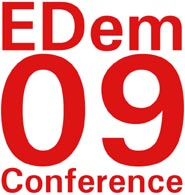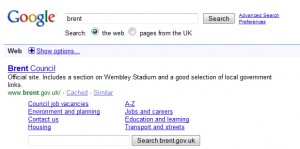Archive for August, 2009
 |
31. August 2009 – 14:08 by Zebralog / Hans Hagedorn
|
Blogactiv.eu is a blog platform dedicated to European affairs. It was launched in 2008 and it is managed by EurActiv,
a European news network. With Blogactiv, the EurActiv-team wants to give Europeans the possibility to “better engage in online in the political debate on key European issues”.
Blogactiv allows an interested public to set up own weblogs and write about their views on the European Union and about European developments concerning their own countries. Additionally there is a weblog for guests who don´t want to set up own blogs, but who want to post articles nevertheless.
The aim as it is published on the website is pretty ambitious: “Blogactiv will become the premier source of content on the future of Europe.” This still seems a way to go:
It is planned to allow blogging in ten languages – but at the moment writing on the platform is restricted to English, French and German. The other languages (e.g. Polish, Romanian and even Turkish) are still waiting to be activated.
While the English and French sections feature quite recent posts, most of them coming from journalists, political analysts, interest groups and so on, the German section is rather empty, the latest entries coming from summer 2008.
by Simone Gerdesmeier, Zebralog Berlin
Posted in Projects, Tools | 1 Comment »
 |
27. August 2009 – 13:02 by Bengt Feil
|
 Real-time or instant communication is one of the major trends of the internet today: Facebook-Chat offers real-time communication, exchanges of thoughts and information happens almost instantly on Twitter, push email on desktop and mobile devices is quickly developing into a standard and instant messaging via standards like Jabber or software like Skype has become an important tools for private and professional communication. eParticipation can benefit from this development as it opens up a door for a new generation of tools and services. But one major component is still missing on the way to the real-time web.
Real-time or instant communication is one of the major trends of the internet today: Facebook-Chat offers real-time communication, exchanges of thoughts and information happens almost instantly on Twitter, push email on desktop and mobile devices is quickly developing into a standard and instant messaging via standards like Jabber or software like Skype has become an important tools for private and professional communication. eParticipation can benefit from this development as it opens up a door for a new generation of tools and services. But one major component is still missing on the way to the real-time web.
In a nutshell the instant updating is achieved by setting up a hub-server which acts as an intermediate and keeps track of all updates on RSS-feeds and quickly informs all subscribers. A quick introduction to the technical basis is given in the following presentation:
In summary the very simple implementation of this standard would allow all kinds of websites to exchange various sorts of content instantly. It is like changing setting up phone lines between different islands instant of using ships transporting paper mail. Consequently pubsubhubbub (despite having a rather silly name) could be a major building block of the real-time web.
The next generation of eParticipation tools which make use of the real-time web and its underlining technologies could be more distributed and can engage the participants where ever they are on the web without being totally depended on third party platforms like Facebook etc.. One example could be to integrate discussions on Twitter etc. on a given topic to an eParticipation site and to use instant updating RSS to have both discussions linked to one another.
To get more information about this project or to try out what can be done with it I would suggest taking a look at the project page or this short tutorial of how to implement it.
Posted in Tools, Trends, Visions | 1 Comment »
 |
26. August 2009 – 13:25 by Zebralog / Hans Hagedorn
|
Expectation were high: The 2009 German Federal Election should be a real “online election” with big online campaigns, inspired by the success the Obama-campaign had had in 2008.
And indeed politicians like German chancellor Angela Merkel (CDU) or the counter-candidate Frank-Walter Steinmeier (SPD) do have their profiles in well-known social networks: You can find their profiles on Facebook as well as on the German social networks StudiVZ and MeinVZ. Candidates´ logos and websites resemble Barrack Obamas Websites with big pictures, videos and links to other online activities (see Merkel, Steinmeier).
But does it transferring the American campaign to the German Federal Elections really work?
Micah Sifri says: No!
Sifri founded the web-portal Personal Democracy and writes for the weblog Techpresident.com. In an interview with the German web-format “Elektrischer Reporter” he says that the main problem is that the German elections are status-quo-elections rather than change elections: “In a status-quo-election, where the candidates are not exciting, the internet won´t change that.” Only when there is a desire and a real chance for political change, volunteers who can exhaust the possibilities of the internet get more important.
According to Sifrin, Obama had understood the power of these volunteers and of voter generated activity and did not concentrate on one specific tool or one specific network, but on a combination of them all. (You can view the video-interview here: https://www.elektrischer-reporter.de/rohstoff/video/152/ . The audio is in English.)
Nevertheless some projects by civilians give an anticipation how a voter-driven activities online could look like in Germany. One of them is website “wechsel-waehler.de” (Wechselwähler meaning swing voter). Six swing voters moved in a shared flat where they will live until the elections. They blog about their political viewpoints and about recent news - and on each Sunday they have breakfast with a political guest. Videos of these Sunday roundtables can also be viewed on the website.
Simone Gerdesmeier, Zebralog Berlin
Posted in Interview, Trends, Uncategorized | 1 Comment »
 |
18. August 2009 – 08:45 by Olga Lacigova - 21c
|
The Czech Republic EU presidency from January to June 2009 was according to the Czech Foreign Minister Kohout good, but not the best. “The Czech presidency rather focused on deeds that on procedures and processes,” said Kohout. However, one of the good things that the Czech Republic achieved during its presidency premiere was to create a website that was selected as one of the finalist for the annual eDemocracy Award. The website, EU2009.cz, was selected for using the internet to contribute to reinforcing democracy and for involving citizens in public debate. The website had more than 2 million visitors which is more than previous presidency websites. The winner will be announced on 23rd of October in Paris.
Sources:
-Veronika Cvejnová, editor-in-chief of the Czech EU Presidency website
-Prague Daily Monitor
Posted in Uncategorized | No Comments »
 |
18. August 2009 – 08:44 by Interns at 21c
|
Since April 2009, the government attempts to reform the MPs Expenses witch illustrates a problem inherent in democracy: the salaries of officials. Indeed the expenses of MPs finally became public after 3 years of blocking the House of Commons.
After such of information discloses, the court ruled that MPs demanded too much money to meet their personal needs (entertainment, passion, housing…).
No wonder members want to avoid the claims of their expenditures, with are on average £ 118.000 per year, and the government imposes cuts on the wages in the public sector. For example MPs claim their subscription to Sky TV and Television licensing services, consulting fees and services fess, insurance and sale on their property.
How are MPs supposed to reassure the thousands of working poor who have lost their personal property, such as their home because they could not meet the higher repayments of credits? In fact, we can see that these low-paid workers are seeking second jobs in order to pay their bills, but they take particular risks with regard to their health.
So that the public expressed, we can see that there are many blog such as MySpace, Facebook and Google. However there are not particular many forums.
To illustrate this, we took the example of a forum* witch raises the question of MPs Expenses. On this forum, users can express their views freely on the fact that they are for or against this system. For instance, people write their stories to illustrate their argument with the situation.In contrast, others believe that spending money and requests from to payers is unfair, since the salaries of MPs are already very high.
We took also an example on Facebook, where we can see that groups are freely formed, without influences on this subject. Here we have the case of a petition on the MPs Expenses so people, young and old, can speak freely and say whether they support or not the system.
During the last weeks, the government has been upset because of the spending scandal. This change can be illustrated by the post article on BBC**, and we can see that the Prime Minister and David Cameron have clashed over government spending. Code of conduct will be imposes on all members new rules on have to better regulate government spending and avoid committing injustices. Great Britain can not continue on the path, this level of spending and taxation but must react very quickly.
by French Interns at 21c
Posted in Uncategorized | No Comments »
 |
18. August 2009 – 08:43 by Interns at 21c
|
The 2009 European elections were held from the 4th to 7th June, in the 27 Member States of the European Union. These elections are designed to elect the new Parliament by which over 500 million Europeans are represented. During these European elections, political campaigns were hardly recognized in traditional Medias such as print and television but have beaten the record on Internet. In recent years, the European Parliament started a process of raising political awareness amongst young people and has been encouraging them to vote by using Web 2.0 media. However, the initiative is in its origins and may take several years before we see the change.
In Britain, the defeat of the Labour Party was expected. But its magnitude was surprising. In fact, the British National Party (BNP), from British extreme right, will for the first time enter the Parliament after winning two seats in the European elections. The success of the BNP is a new blow for Gordon Brown, increasingly challenged within his own party. The Labour Party, weakened by the MP expenses scandal, was relegated to third place with only 15.3% of the vote, behind the anti-UKIP (United Kingdom Independence Party) with 17.4%, and the Conservative Party, which wins the elections (28.6%).
This tendency for the extreme right is reflected in the resurgence of distrust in politics that has been prompted by the scandal of excessive repayment of personal expenses of many MPs and some ministers. The enemies of British Nationalism continue to parrot the claim that the BNP is a “racist party.” This claim is most often repeated because the BNP unashamedly addresses itself to the issues and concerns of the indigenous British population, and because it seeks to ensure that British people remain the majority population in this country.
Opponents point to the fact that the BNP has an all-white membership policy, and that they address issues concerning only white people while the UK is a multiethnic place. The European elections are not without consequences on the future of the United-Kingdom. Indeed, the future relations between Europe and the Great-Britain can be serious damaged. Therefore, we think that the EU parliament should continue with their online campaigning to increase turnout.
by French Interns at 21c
Posted in Uncategorized | No Comments »
 |
13. August 2009 – 08:42 by pol-di.net e.V / politik-digital.de
|
For the upcoming German Federal election 2009, politik-digital.de, in a joint project with pro-bono TV production, published a video clip which shows various celebrities telling not to vote. You can watch the clip here (sorry, I couldn’t embed the clip):
Geh nicht hin!
For those of you who are non-German speakers, find an english article about the project on DW-World.de. This article comes along with a radio interview including a statement by politik-digital.de executive director Stefan Gehrke.
Posted in Interview, News, members | No Comments »
 |
13. August 2009 – 08:41 by Centre for E-Government
|
The annual Conference on eDemocracy will take place at the Vienna University of Economics and Business on September 7 and 8.

The upcoming conference gives experts and the interested public the opportunity to exchange ideas and opinions about the influence of the web 2.0 on our democracies. There are a number of eDemocracy applications, ranging from transparency and information sites, discussion panels, deliberation and consultation platforms to decision-making and voting systems, thus encompassing the entire democratic process.
Costs:
EUR 95,- for authors
EUR 115,- early-bird-rate for PEP-Net members
EUR 135,- for participants who register after July 17, 2009
Instructions:
In order to profit from your PEP-Net membership, please note your PEP-Net member status when registering. If you have any questions, please contact julia.landgraf@wu.ac.at .
We are looking forward to seeing you soon in Vienna …
Further Information:
Posted in Events | No Comments »
 |
10. August 2009 – 08:39 by Centre for E-Government
|
Censorship in China is not new. The Chinese government has mandated to install specific filtering software, Green Dam, on every computer sold in the country. Companies that want to sell computers in China shall pre-install Green Dam which is supposed to protect children from inappropriate internet content. Of course, the software can also be used for different purposes, giving the Chinese government the possibility to monitor personal computers; in addition to the already operating so-called Great Firewall of China. Green Dam does not merely control the computer’s data, it might also cause fatal errors as the software code does not fit to quality standards and offers rather poor parental control options. “Given the resulting poor quality of the product, the large negative security and stability effects on the Chinese computing infrastructure and the intense backlash against the product mandate, the mandate may result in less government control.” (OpenNet) It is probably for these reasons, that the mandate has temporarily been delayed to an unknown date. Even though, companies based in democratic countries already ship personal computers with the required software to China.
Regardless of the surveillance of the internet, Chinese internet users also found ways to avoid censorship. Chinese authorities do not tolerate officially inappropriate religious and political statements and want its citizens to behave according to national political correctness. Therefore, the language used in internet forums is monitored by Chinese agencies as vulgar expressions are not accepted. Creative users replace offensive language by similarly sounding expressions and mock official regulations. As a result, songs about the Grass Mud Horse (Chinese: cao ni ma) became amazingly popular on Chinese YouTube channels. The animal that has its natural habitat in the Gobi Desert (ge bi) is similarly pronounced as the very vulgar Chinese expression cao ni ma ge bi.

Sources:
Posted in News | No Comments »
 |
7. August 2009 – 08:38 by Fraser Henderson - ICELE
|
Google have taken a more aggressive stance in targeting the public sector with the launch of Google LocalGov here in the UK. While the offering is not particularly different from what anybody else can get, it certainly deserves some attention in terms of relevance. The pitch goes something like:
• Direct users to your site (enable people to find you better, position your authority as the no.1 destination)
• Manage your costs by making your website work harder (drive more traffic through the online channel to reduce print/call centre costs)
• “Monetise” (raise revenue from what you’re doing)
• Justify what you’ve done. Now more than ever data beats opinion (test, measure, optimize)
For example, Nottingham City Council has been using context sensitive ads on their site for about a year now and it returns a healthy return of around €13,500 per year in click-through revenue. In that time there have only ever been three complaints from the public and one of these related to the ‘type’ of advertisement displayed – easily rectified by the council. Arguably context sensitive advertisements on public sector pages can actually help citizens find services. So why don’t all councils do this? They also use Google Maps and Google Mini.
On the return path, the London Borough of Hillingdon (among others) pays for ‘Adwords’ on the Google search engine. They were able to target an audience within a 15 mile radius (estimated targeting accuracy 80 – 85%) to their annual Christmas market, achieving half a million impressions and a 1% click through rate. The cost per click (CPC) is a bit of a secret but reading between the lines my estimate is about 10p.
101 Rap
Click here to see the Goole top 10 tips for making websites work. Public authorities should also get wise to how Google indexes them. Done correctly and you get much better results:-

Then there’s Google Enterprise – which effectively replaces IT departments. Google estimate the cost of their cloud computing solution as £33 per user per year – and that the it costs the average IT department £200 per user per year just for email. Bear in mind Google gives you 25GB per user storage space!
OpenSocial, FriendConnet, Google Health, Google Optimiser, Google Analytics, Google Voice, Android, iGoogle…..do we need third party eParticipation software any more? There is certainly no excuse for avoiding OpenID or using insight to refine web design and ‘convert’ lurkers to participants.
Posted in Tools, Trends, good practice | No Comments »










